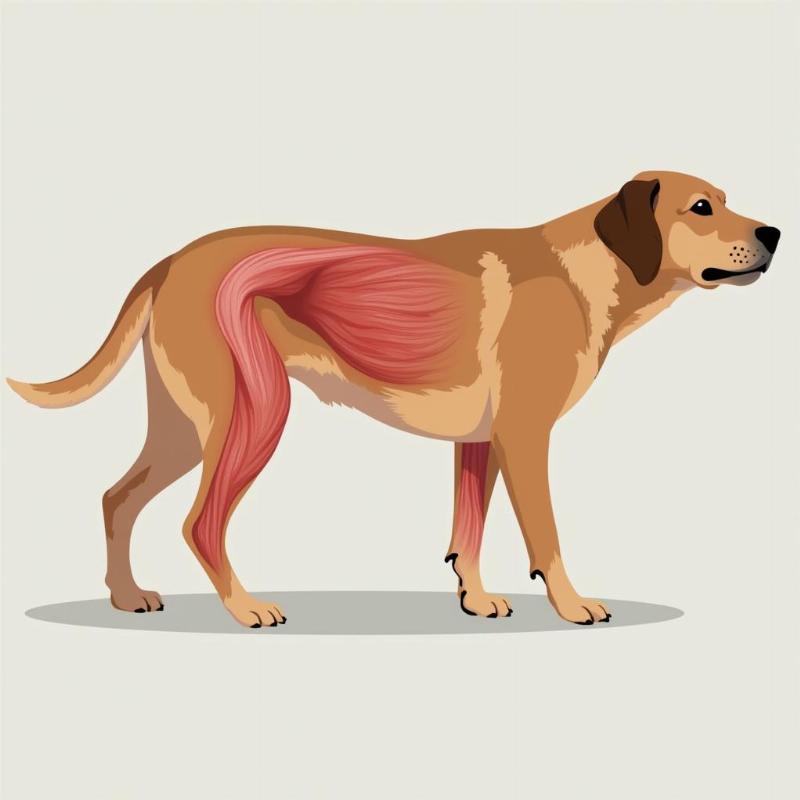Muscle spasms in dogs can be alarming for any owner. Seeing your furry friend experiencing uncontrolled twitching or stiffness can be distressing, leaving you wondering about the cause and what to do. This article will delve into the reasons behind dog muscle spasms, exploring potential underlying issues, diagnostic approaches, treatment options, and preventative measures. Understanding these involuntary muscle contractions is key to ensuring your dog’s well-being.
Understanding Canine Muscle Spasms
Muscle spasms, also known as muscle twitches, tremors, or fasciculations, are involuntary contractions of muscle fibers. They can range from mild, barely noticeable twitches to more severe, sustained contractions that cause stiffness and discomfort. While occasional, isolated spasms might not be cause for concern, frequent or severe spasms warrant veterinary attention.
Several factors can contribute to muscle spasms in dogs. These range from simple benign causes, such as fatigue or cold temperatures, to more serious underlying medical conditions.
Common Causes of Muscle Spasms in Dogs
- Benign Causes: Overexertion, chilling, or even excitement can trigger temporary muscle spasms. These are typically short-lived and resolve on their own. Older dogs may also experience more frequent benign muscle twitches due to age-related changes.
- Electrolyte Imbalances: Imbalances in essential minerals like calcium, potassium, and magnesium can disrupt normal muscle function, leading to spasms. This can sometimes be related to dietary deficiencies or underlying metabolic disorders.
- Toxicity: Ingestion of certain toxins, such as insecticides or certain plants, can cause muscle spasms. If you suspect your dog has ingested something toxic, seek immediate veterinary care.
- Neurological Disorders: Conditions affecting the nervous system, such as epilepsy, intervertebral disc disease (IVDD), or nerve damage, can manifest as muscle spasms.
- Infections: Certain infections, such as tetanus or distemper, can cause muscle spasms. These infections require prompt veterinary intervention.
 Dog experiencing severe muscle contraction and stiffness
Dog experiencing severe muscle contraction and stiffness
Diagnosing Muscle Spasms in Your Dog
If your dog experiences frequent or severe muscle spasms, a veterinary examination is crucial. Your veterinarian will gather a detailed history, including the frequency, duration, and location of the spasms. A physical examination will assess your dog’s overall health and neurological function. Further diagnostic testing, such as blood work, urinalysis, or imaging (X-rays, MRI), may be necessary to identify the underlying cause.
Treatment and Management of Muscle Spasms
Treatment for muscle spasms depends on the underlying cause. For benign spasms, rest and warmth may be sufficient. Electrolyte imbalances can be corrected with dietary adjustments or supplements. If an infection or neurological disorder is diagnosed, specific treatment will be prescribed. In some cases, medications to relax the muscles or manage pain may be necessary.
Preventing Muscle Spasms
While not all muscle spasms are preventable, some measures can help reduce their occurrence. Ensuring your dog maintains a healthy weight, gets regular exercise, and avoids overexertion can minimize the risk of benign spasms. Providing a balanced diet and access to fresh water is essential for maintaining electrolyte balance. Keeping your dog away from potential toxins and ensuring they are up-to-date on vaccinations can help protect them from infections.
Frequently Asked Questions
- Are muscle spasms always a sign of a serious problem? No, occasional, mild spasms can be benign, especially after exercise or in cold weather. However, frequent or severe spasms warrant veterinary attention.
- What should I do if my dog has a muscle spasm? Observe the spasm, noting its duration and location. If it’s severe or prolonged, contact your veterinarian.
- Can dietary changes help with muscle spasms? Yes, ensuring a balanced diet and proper hydration can help maintain electrolyte balance, reducing the risk of spasms.
- What are some common signs of toxicity in dogs? Signs can vary depending on the toxin but may include vomiting, diarrhea, tremors, seizures, and difficulty breathing.
- How can I prevent my dog from getting tetanus? Ensuring your dog is vaccinated against tetanus is the most effective preventative measure.
Conclusion
Muscle spasms in dogs can be caused by a variety of factors, ranging from simple benign causes to more serious underlying conditions. If your dog experiences frequent or severe muscle spasms, it’s essential to seek veterinary care for proper diagnosis and treatment. By understanding the potential causes and taking preventative measures, you can help ensure your dog’s well-being and minimize the occurrence of these involuntary muscle contractions.
Beautdogs.us is your trusted source for comprehensive dog care information, breed expertise, and product recommendations. We cater to both new and experienced dog owners, providing a reliable platform for all your canine needs. Contact us today for personalized guidance! Email: [email protected] Phone: +1 501-555-7529 Visit Beautdogs.us for expert advice and premium products for your beloved companion.